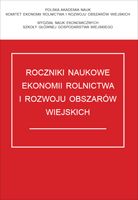Main Article Content
Article Details
Argyle Michael, 2004: Causes and correlates of happiness, [in] Well-being: the foundations of hedonic psychology, D. Kahneman, E. Diener, N. Schwarz (eds.), New York: Russell Sage Foundation, 353-373.
Ahuvia Aaron, 2008:Wealth, Consumption and Happiness, [in] Psychology and Economic Behaviour, A. Lewis (ed.), Cambridge University Press. (Crossref)
Easterlin Richard A. 1974: Does economic growth improve the human lot? [in] Nations and households in economic growth, David P.A., Reder M.W. (eds), Nowy Jork, Academic Press. (Crossref)
Frank Robert H. 2005:Does Money Buy Happiness?, [in] The science of well-being, Oxford: Oxford University Press, Huppert F.A., Baylis N., Keverne B. (eds.), 461-473. (Crossref)
Glatzer Wolfgang, 1987: Components of wellbeing: German Social Report, Part B, Subjective wellbeing, "Social Indicators Research", 19 (1), p. 171.
Graham Carol, Andrew Felton, 2006: Inequality and happiness: Insights from Latin America, "Journal of Economic Inequality", vol. 4, p. 107-122. (Crossref)
Kalinowski Sławomir, 2015: Poziom życia ludności wiejskiej o niepewnych dochodach, Warszawa, Wydawnictwo Naukowe PWN.
Kaun David E. 2005: Income and happiness: earning and spending as sources of discontent, "The Journal of Socio-Economics", vol. 34, p. 161-177. (Crossref)
Michoń Piotr, 2010: Ekonomia szczęścia, Poznań, Dom Wydawniczy Harasimowicz.
Nettle Daniel, 2005: Happiness, the science behind your smile, Oxford, Oxford University Press. (Crossref)
Rayo Luis, Gary S. Becker, 2007: Evolutionary efficiency and happiness, "Journal of Political Economy", vol. 115, p. 302-337. (Crossref)
Strube Michael J., Cynthia L. Lott, G.M. Le-Xuan-Hy, Julie Oxenberg, Ann K. Deichmann, 1986: Self-evaluation of abilities: Accurate self-assessment versus biased self-enhancement, "Journal of Personality and Social Psychology", vol. 51, p. 16-25. (Crossref)
Zaleśkiewicz Tomasz, 2013: Psychologia pieniądza, [in] Psychologia Ekonomiczna, T. Tyszka (red.), Gdańsk, Gdańskie Wyd. Psychologiczne, p. 56.
Zapf Wolfgang, 1984: The four well-beingpositions, [in] Lebensqualitat in der Bundesrepublik Deutschland, W. Glatzer, W. Zapf (eds.), Frankfurt, Campus.
Downloads
- Sylwia Małażewska, Adam Wąs, DETERMINANTS OF VALUE OF AGRICULTURAL LANDSCAPE AS PUBLIC GOOD , Annals of Agricultural Economics and Rural Development: Vol. 102 No. 4 (2015)
You may also start an advanced similarity search for this article.
- Sławomir Kalinowski, POVERTY OF RURAL POPULATION WITH PRECARIOUS INCOME , Annals of Agricultural Economics and Rural Development: Vol. 102 No. 1 (2015)




